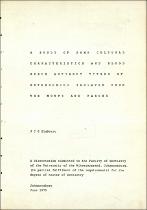A study of some cultural characteristics and blood serum antibodies: titers 0f enterococci isolated from the mouth and faeces
Abstract
Crevicular epithelium presents no effective barrier to the
biologicaJly active constituents of plaque. Moreover, it
seems that the production of circulating antibodies, the
development of a state of delayed hypersensitivity and the
development of immunologicai tolerance all play a part in
the pathogenesis of periodontal disease. An investigation
was undertaken to study the cultural characteristics of
enterococci isolated from the mouth and gut of a group
of students, and to determinethe serum antibody titres to
these organisms. Enterococci were isolated from faeces
and the gingival crevice of 9 male dental students. Blood
was obtained from each subject and allowed to clot. The
serum was removed and stored at -20 0 C• unt'i l requi• red. Blood
serum antibody titres to the bacteria were obtained by the
indirect fluorescent antibody technique. In order to
investigate for the presence· of antibodies to homologous
and heterologous enterococcal strains, each subject's serum
was tested against all the strains of enterococci isolated.
Higher antibody titres were obtained to oral enterococci
than to faecal microorganisms. This investigation suggests
that there are either differences in the immunogenic
iii
potential of oral and faecal streptococci or micro-environmental
conditions in the host which favour antibody production to oral
streptococci as opposed to streptococci in the gut. There are
also differences in the cultural characteristics and bio=
chemical reactions of the gut and mouth organisms.

